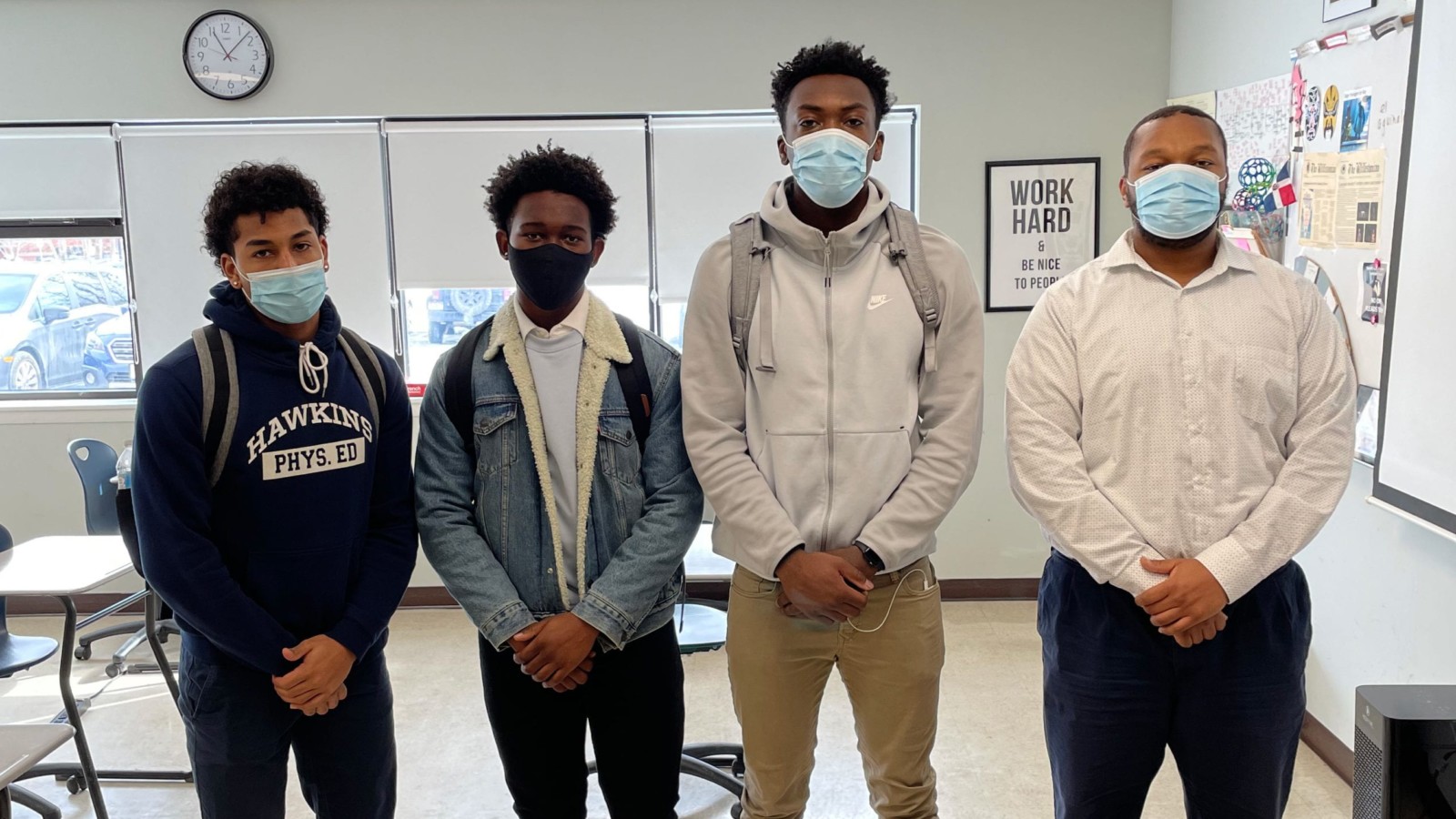Three student speakers addressed Assembly this week, asking the Williston community to see beyond their surface identity as Black male athletes. As part of Black History Month, these presenters shared a bit about who they are, in addition to the sports they play. Psychology teacher Matthew Porter, himself a Black man, introduced the three by telling the audience that there is a belief that Black men at Williston haven’t done their part to back up Black women on campus who are fighting for change, but that, “it’s time we do our part.”
“I hope everyone will take this opportunity to not only hear us but really listen to the messages today,” he said.
Porter told the community he was raised on the South Side of Chicago by family members, many of whom were from the South. “Learning about Black history was always a priority,” he said. “Every Black History Month for the first seven years of my life I learned about different people who looked like me that contributed to the advancement of America. I learned about something called appreciation. I really learned to appreciate those before me who didn’t get the opportunity to see their visions through.”
Porter then introduced Eniola Falayi ’21.
Falayi is from Massachusetts and his parents emigrated from Nigeria, meeting in the States. “On this campus people know of me just as a football player,” he said. “But I want people to see past that, and realize I work hard in the classroom and in other aspects of my life just like others. I am into fashion and entrepreneurship and I could see them being in my future.
“Black History Month means a lot to me because I feel like it is a great opportunity to show what people who look like me have done for us in the past and what they are doing for us now,” he continued. “Although Black history deserves way more than a month, the time we do have allows us to recognize that Black and Brown people are just as important to this country as anybody else. We are smart, hard-working, and strong individuals coming from all different cultures and ethnicities, and our differences need to be celebrated not causes of punishment.
“Being a black athlete brings my value up because sports and entertainment are so important to our society. But I want people who value my athletic ability to also value the young black boy who is interested in engineering or the arts.”
He then passed the screen to Andre Washington ’21. Washington is from Staten Island, a borough of New York City, and identifies as Hispanic and Black. He pointed out the difficulties young Black people face: “Being a black teen in today’s society is dangerous and uneasy,” he said. “This past year we have seen America’s true colors and the racial injustice towards the lives of numerous Black and Brown people, both male and female.”
While he said he is known for his skills on the basketball court, there is more to him than athletics. “I use basketball as a tool to open new doors for me and to better my future. However, I want you all to look past that…I am more than just a basketball player. My goal is to one day give other young Black kids in my community the same opportunities that I have had, such as going to prep school and gaining a college education.”
The final presenter was Matthew Moreno ’21. “As many of you may know I’m a soccer player but that is not my entire identity. I’m Bermudian-Trinidadian and my ethnicity is Afro-Caribbean. My family is from Bermuda, Antigua, and Trinidad, and I’m proud of my Caribbean heritage.”
Moreno continued: “Growing up I never really considered my race to have a major impact on my life because Bermuda and Trinidad are both majority Black and Brown countries. It wasn’t until I first came to America that I started to realize how big an influence my race has.
“Being a young Black man in the world for me is kind of unpredictable. You never know how people will act towards you because, although the world is a lot more accepting than it used to be, there’s still a lot of work to be done. There’s a fear that comes with living in America that I don’t have when I’m back in the Caribbean. When I’m back home in Bermuda or Trinidad I don’t have to watch how I carry myself as much as I do here in America. I can talk how I normally do without having to change my accent or how I pronounce or phrase words and sentences, I can finally relax and just be myself. The culture difference between the Caribbean and New England makes it difficult to express my identity, and I feel like I have to fit a description to be acknowledged beyond my sport.”
Moreno said he enjoys photography and music production, and hopes to work in psychology someday. “Although I appreciate being acknowledged for my athletic accomplishments,” he said, “I want people to understand that soccer is just one part of who I am and doesn’t make up my entire identity.”
Psychology teacher Porter reminded listeners that these three students exhibited courage in sharing their story and reminding their peers that Black athletes deserve to be seen as who they are: people with inner lives, fears, hopes, ambitions, and dreams.
“I am really proud of these young men who spoke today, because they did something that I definitely didn’t think about doing when I was their age,” Porter said, in closing. “Sharing your story is not easy no matter how social or comfortable you think you are. … Especially during this month, let us learn to appreciate Black and Brown lives just as much as the culture it is tied to.”

